The Harvard-Yale Game Climate Protest
December 2, 2019
On Saturday, November 23rd, climate change demonstrators stormed the field during halftime at the annual Harvard-Yale football game. The demonstration began with 70 students who were subsequently joined by hundreds more in the stands, and at its peak, 500 people stood on the field demanding that the schools withdraw money invested in fossil fuels. It is no secret that Harvard and Yale have among the largest endowments in the country, and many students believe that such institutions’ divestments could have a serious impact. The protesters delayed the game for nearly an hour and drew attention from news outlets across the country.
Harvard-Yale football is one of the oldest rivalries in American sports, and the game attracts enormous crowds each year. Between the students, families, and alumni in the crowd, spectators had a variety of reactions to the protest. Recent Latin alumni and current Yale freshman Lily Campbell attended the game. “In the section where I was sitting, people were booing, saying ‘this is a football game,’” she said, “if they were upset it was mainly because they were concerned about watching the game.” However, she said that some critiques were more aggressive, as “there were a few people who were actually upset with the content of the protest itself, saying ‘divestment wouldn’t fix anything,’ and calling them ‘liberal snowflakes.’”
Some students went so far as to cheer on the law enforcement. Lily recalled, “I left when people behind me started chanting ‘YPD’ for ‘Yale Police Department’ which just felt obnoxious and insensitive given the fact that YPD is currently a point of contention for the shooting of Stephanie Wahington.” By the end of the hour, the Yale police had surrounded the students enough for them to leave the field and by the end of the day, they issued 42 warrants for disorderly conduct.
In addition to drawing attention from local law enforcement, Lily pointed out that due to today’s media coverage, “Hours after the protest there were articles everywhere. It was all over Instagram, almost every major news publication picked up the story and ran it as a front-page article, and it was even one of the featured stories on DailyMail on Snapchat.”
With the protest all over social media, it was not long before Latin students heard about it. Junior Pamela Cameron said, “Although I do agree that it’s a big cause, I think that it’s really unfair to the students, family, and friends that came out in addition to the players.” She emphasized that while climate change is a big issue, this was supposed to be a time to celebrate the players, saying, “This is a really big game for them and I just really don’t think it’s fair to all of the hard work they have put in this year.”
Junior Marianne Mihas agreed that it did not seem fair to penalize the athletes. “The football team is not adding to the emission of greenhouse gases,” she continued, “sure they have to take a car to a game or two, but these people coming onto the field during the biggest Ivy League football game is a little ridiculous.” She believes that such events should be separated from politics, and wondered, “What has the world come to that we can’t go to a normal football game and have everyone be happy without some protest?”
Other students thought that the demonstration was well worth the game delay. Sophomore Marin Creamer, who is a co-head of Latin’s Plastic Reduction Club, said, “While I completely understand how people could have been frustrated by the game delay, I think it’s amazing that students are trying to reduce funding for fossil fuel companies in order to help the Earth.” She believes that protesting at these events is a great way of promoting change, and said, “By using a sports game to catch the attention of their schools in addition to people watching the game across the country, the protesters were hopefully more effective.” She was focused on the environmental issue at hand, saying, “It’s great that students are standing up for what they believe in and trying to prevent the events of climate change from worsening.”
Lily also felt that given the severity of climate change, the protest was justified. She was understanding of those who were not as supportive, but said, “Even though it may have been ‘disrespectful’ to the players themselves, it was an excellent use of a popular, public platform to bring national attention to an issue.” Despite the Yale Police Department’s labeling of the protest as a “misdemeanor,” she believes that protests like these are exactly what Yale students should be doing. “Yale and Harvard students—and pretty much the majority of college students—are emboldened and encouraged by their universities to be change-makers, and this was nothing short of following the universities’ message,” she pointed out.
If change agency is what our education is supposed to be teaching us, why haven’t there been many protests at Latin? Marin suspected, “I think it’s because students are so concerned with their grades and don’t want to divert from their school work.” Unfortunately, “Although climate change is a major issue,” she continued, “I don’t think people understand how extreme global warming is and its impact.” Perhaps this lack of understanding is at the root of Latin students’ qualms about the protest, or perhaps they simply did not think that it was done at the right time and place. Either way, it is interesting that a school that boasts its passionate student body has not seen widespread student protests.
Whether or not everyone supported the distraction from the football game, there is no doubt that the demonstrators brought attention. To many, the buzz surrounding the protest was for the best. In bringing so much attention to such a pressing issue, as Lily said and many believe, “I one hundred percent think it was effective,” and “it was awesome what they were doing.”






































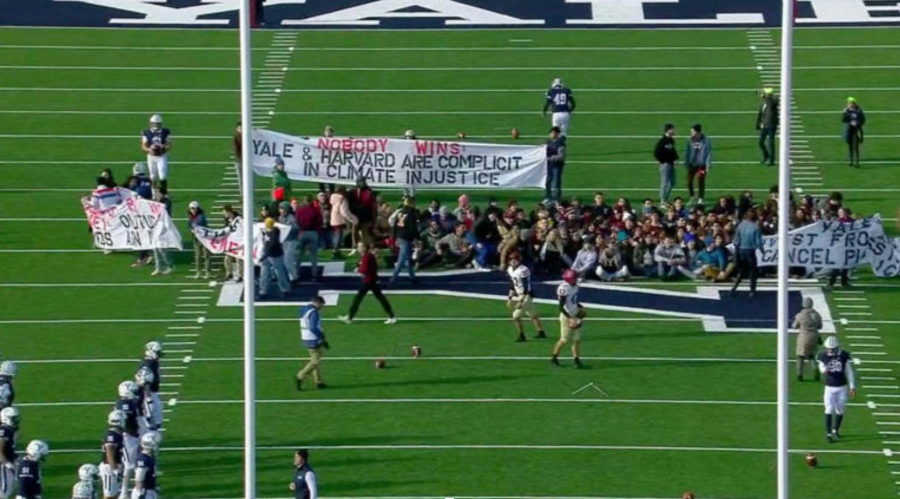

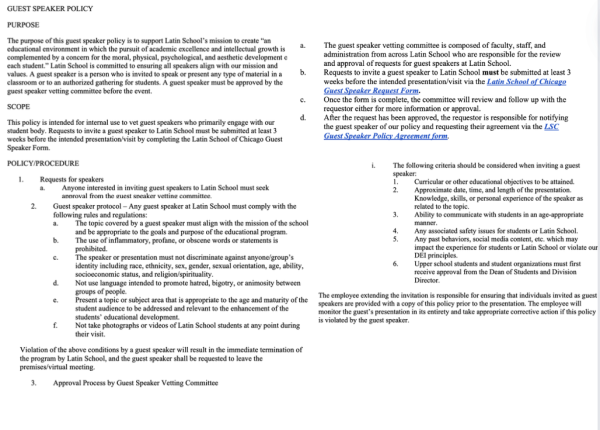


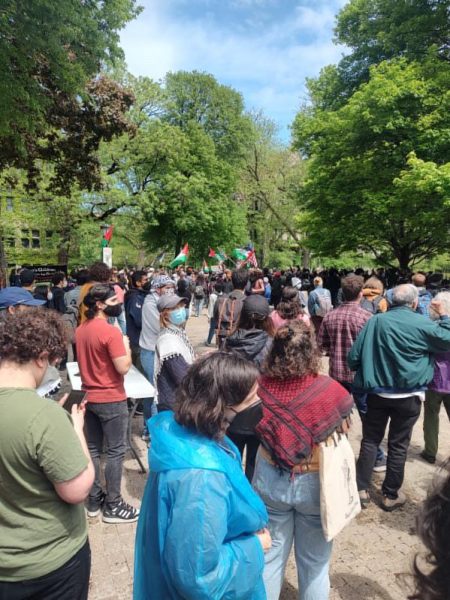

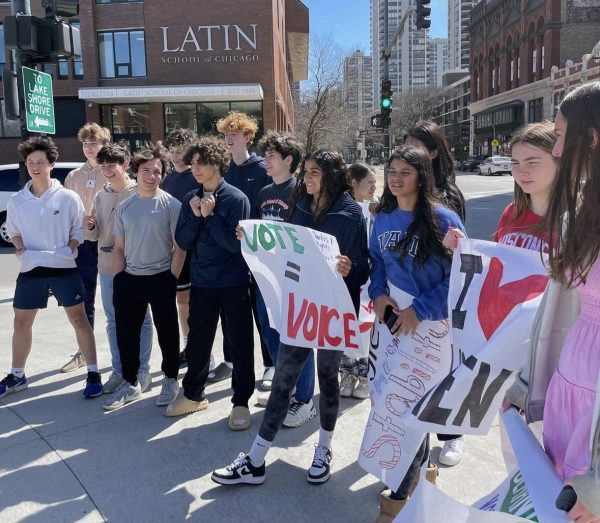


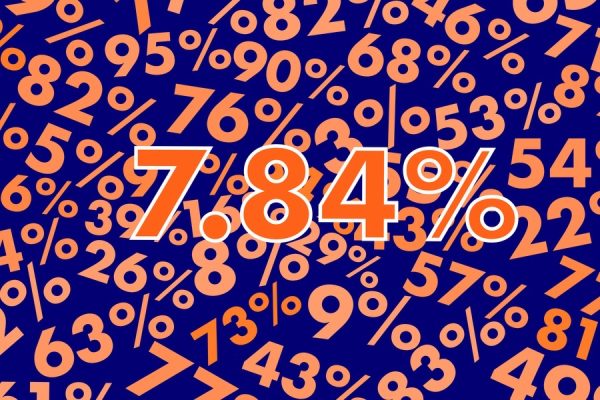






Robert Igbokwe • Dec 4, 2019 at 8:17 pm
Spectacular article, Bea!! 🙂 🙂 🙂 You did a great job covering this story! I’m still conflicted on the issue myself. I think it was unfair to the players, but I also think their message is more important than any football game. And the game eventually went on. Hopefully, the people who need to receive that message do and finally address this pressing issue.
Lily Campbell • Dec 3, 2019 at 12:40 pm
Great coverage, Bea! Thanks for reaching out to me and covering all sides of the story. You’re an excellent writer.